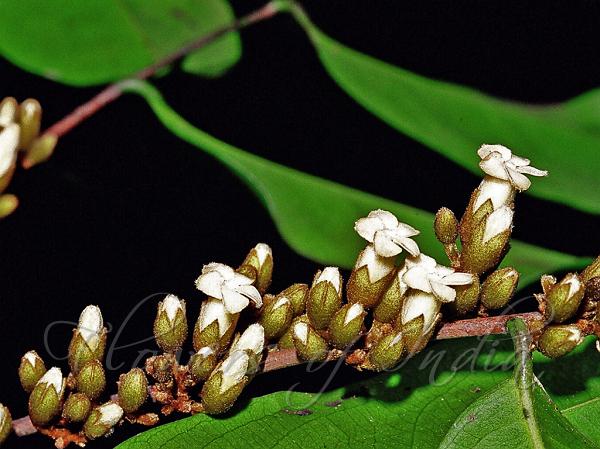|
| Grand Ebony |
|

|

|
|
|
|
Photo: |
Botanical name: Diospyros insignis Family: Ebenaceae (Ebony family)
Synonyms: Diospyros insignis var. parvifolia
Synonyms: Diospyros insignis var. parvifolia
Grand Ebony is a very large tree, with young shoots
somewhat velvet-hairy. Leaves are nearly opposite and alternate,
toughly membranous, hairless, ovate or oblong, tapering, rounded or
somewhat narrowed at base, midrib and lateral veins clearly marked on
the under surface, tertiary veins nearly parallel and transverse to the
midrib, 10-35 cm long by 3.5-15 cm wide ; leaf-stalks 0.6-1 cm long.
Male Flowers are crowded, many together in nearly stalkless lateral
clusters. Calyx is 3-5 mm long, bell-shaped, shortly 4-fid, sepals
ovate, pointed, shortly velvet-hairy outside, hairless inside. Flowers
are 8 mm long, shortly tubular, 4-petalled, pale-woolly outside, petals
short. Stamens are 14-20, nearly hairless, many in pairs. Female
Flowers are 1-3 together, in leaf-axils, stalkless. Ovary is 8-celled.
Fruit is nearly spherical, smooth, nearly hairless, 3.5 cm in diameter,
supported on a thick accrescent woody calyx whose tube forms a cup with
elevated rim, margin reflexed. Grand Ebony is a valuable timber tree.
It is found in South India and Sri Lanka, at altitudes of 600-1000 m.
Medicinal uses: Aerial parts are used in the
treatment of diabetes.
Aerial parts are used in the
treatment of diabetes.
Medicinal uses:
 Aerial parts are used in the
treatment of diabetes.
Aerial parts are used in the
treatment of diabetes. | Identification credit: P.S. Sivaprasad | Photographed in Anamalai Tiger Reserve, Tamil Nadu. |
• Is this flower misidentified? If yes,